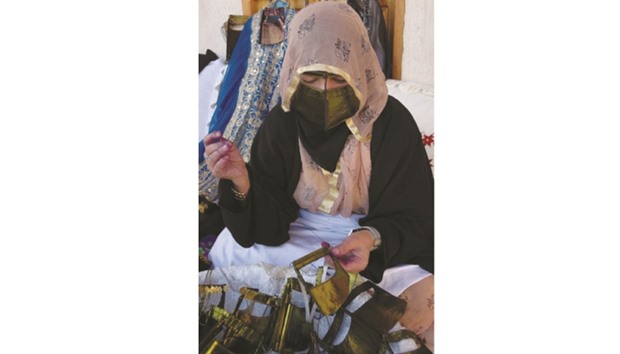Traditional handicrafts are considered a significant part of Qatari national identity; through the traditional crafts one discovers a world of magnificent arts and decorative patterns
The State of Qatar has always shown great interest and care towards its tangible and intangible cultural heritage. Given that heritage forms the foundation of a civilisation and is closely linked to a country’s national identity, the traditional knowledge of Qatar must be maintained and protected through cultural institutions, museums, and passed on to future generations.
Traditional handicrafts are considered a significant part of Qatari national identity; through the traditional crafts one discovers a world of magnificent arts and decorative patterns. These patterns are the product of intellectual, cultural and scientific formation, instinctively and professionally transmitted for generations. Handicrafts were a way for Qatari society to adapt and address daily needs, such as the practice of Al Sadu weaving, jewellery making, the Khumas (palm weaving), leather tanning, wood-carving, traditional tailoring, gypsum carving, metal work, in addition to other marine related handicrafts.
The preservation of Qatari culture and folkloric heritage is as important as ever in the present time characterised by rapid changes and globalisation which has affected and endangered our cultural communities. Technology has an impact on traditional handicrafts, since products are now often machine-made, invading local markets and competing with cheap prices. Not being able to compete with the low prices of machine-made handicrafts, the demand for traditional handmade crafts is decreasing.
Traditional handicrafts in many countries of the world play a prominent role as part of the economic, culture and tourism sectors. The handicraft sector supports the economy of the individual as well as of the society as a whole. Many countries around the world have managed to successfully incorporate their traditional handicrafts industry within other sectors of the economy like the tourism and manufacture industry, turning it into a lucrative enterprise.
There have been several notable efforts from the State of Qatar in support of the traditional handicrafts sector. Unfortunately, these efforts fell short with limited results in spite of the strong support given by the State to nurture heritage. The safeguarding of handicraft practices remains one of the most challenging issues to address in the heritage sector due to the lack of handicraft practitioners in Qatar. In order to enable a new generation of handicraft practitioners to evolve and flourish, it is essential to develop a clear strategic plan and make available financial resources in support of the sector.
Positive efforts are made towards nurturing traditional handicrafts on an individual level by experts in this field such as practitioners and researchers from cultural and educational institutions, as well as through the co-operation of a number of relevant ministries and institutions in Qatar. Cultural forums and conferences play a prominent role in drawing public attention to the importance of preserving traditional handicrafts and providing a platform to discuss the opportunities and the challenges of the handicrafts sector in many countries around the world.
In conclusion, the cultural public institution known as “Katara Cultural Village” has made many efforts to embrace all cultural forums along with relevant issues for debate and dialogue to reach optimal solutions serving the local and global community.
[Next Tuesday Mohamed Saeed al-Bloshi, heritage consultant at the Department of Heritage and Public Libraries of the Ministry of Culture and Sports will be introducing a selection of Qatar’s traditional handicraft practices.]
* Salma Ali Rashid al-Noaimi graduated from Qatar University in 1992 with a specialisation in Art Education. After working as an art teacher for 12 years she was appointed director of the Popular Innovation Center. Following her work at the Public Authority for Youth for five years, she became the head of the Heritage Activities Department at the Ministry of Culture, Arts and Heritage. Currently she is cultural adviser for the General Organisation of Katara Cultural Village and a researcher in folklore. Salma al-Noaimi specialises in heritage and cultural exhibitions management and moderation of lectures, seminars and conferences.

An artisan at work
